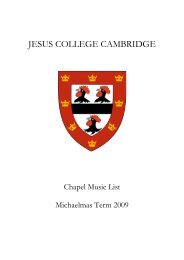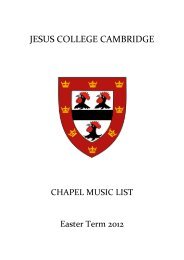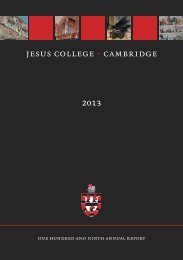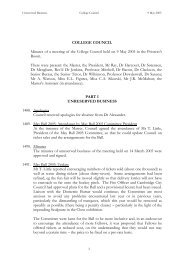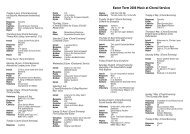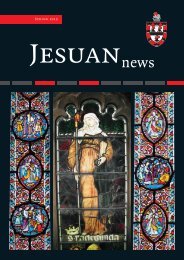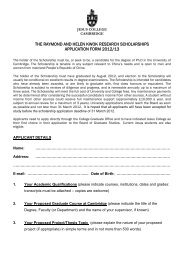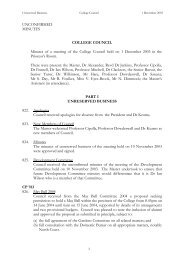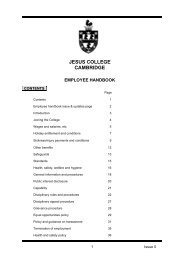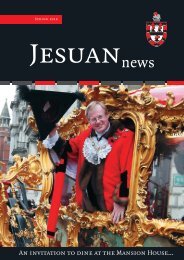2012 Annual Report - Jesus College - University of Cambridge
2012 Annual Report - Jesus College - University of Cambridge
2012 Annual Report - Jesus College - University of Cambridge
Create successful ePaper yourself
Turn your PDF publications into a flip-book with our unique Google optimized e-Paper software.
130 OBITUARIES I <strong>Jesus</strong> <strong>College</strong> <strong>Annual</strong> <strong>Report</strong> <strong>2012</strong><br />
CIVIL, Colin Trevor (1959) died on 5 November 2010 aged 71.<br />
Colin Civil was born on 20 March 1939 in Northampton. He was educated at All Saints'<br />
School, Bloxham. He came up to <strong>Jesus</strong> in 1959 and read Economics and Law, graduating<br />
BA 1962; MA 1968. He married Bridget and they had three sons. The college has no<br />
further information about his life after college.<br />
CLOVER, Morriss Fairfax (1944) died on 6 March 2011 aged 84.<br />
Morriss Clover was born on 25 August 1926 in Saltash, Cornwall. Educated at<br />
St Edward’s School, Oxford, he came up in 1944 to read Mechanical Sciences.<br />
He graduated BA 1947; MA 1951. Following graduation he undertook National Service in<br />
the Royal Navy. After demobilisation he joined Paxman Diesels Limited; remaining with<br />
the firm for 40 years. Whilst working at Paxman he served in the Royal Navy Volunteer<br />
Reserve rising to the rank <strong>of</strong> Lieutenant Commander.<br />
He married Shirley Margaret Evans in 1957; the couple had two sons and two<br />
daughters.<br />
CROOK, John Hurrell (1954) died on 15 July 2011 aged 80.<br />
John Crook was born on 27 November 1930 in Southampton. Educated at Sherbourne<br />
School and the <strong>University</strong> <strong>of</strong> Southampton, he came up to <strong>Jesus</strong> in 1954 following<br />
National Service in the Far East. He found his experiences during National Service very<br />
enriching as he was introduced to Buddhism and also experienced the interplay <strong>of</strong> the<br />
British class system. At <strong>Cambridge</strong> he undertook a thesis on The Comparative Ethology and<br />
Social Organisation <strong>of</strong> the Weaver Birds. In his thesis he succeeded in tracing certain<br />
correlations between the type <strong>of</strong> sexual display shown by each species and its habitat<br />
selection, its sociality and its nest construction. He graduated, PhD 1958. In 1962, he<br />
joined the psychology department at Bristol <strong>University</strong>, there his studies moved to<br />
primates and he led field trips to Africa.<br />
We are grateful to John's colleague, at Bristol <strong>University</strong>, Pr<strong>of</strong>essor Innes Cuthill, for<br />
the following:<br />
"[he was] a pivotal figure in the rise <strong>of</strong> British primatology and socio-ecology ...<br />
John’s work added ‘ecology’ to ‘ethology’, and he is widely regarded as having<br />
introduced cross-species comparisons to the scientific toolkit <strong>of</strong> animal behaviour. His<br />
pioneering studies <strong>of</strong> primates as well as birds had a large influence in the growth <strong>of</strong> the<br />
fields now known as behavioural ecology ... Tackling one <strong>of</strong> the biggest questions in<br />
psychology, his 1980 book “The Evolution <strong>of</strong> Human Consciousness” was also<br />
influential in stimulating a new wave <strong>of</strong> evolutionary approaches to this age-old<br />
problem. By the start <strong>of</strong> the 1990s, his attention had shifted to human social behaviour,<br />
studying the polyandrous (‘multi-husband’) marriage system <strong>of</strong> the hill-tribes <strong>of</strong> Ladakh<br />
and interpreting this as a social adaptation to the harsh farming conditions in the<br />
Himalayas. However, with a long-standing personal interest in Buddhist philosophy, his<br />
research moved away from ecology towards studying the social and spiritual lives <strong>of</strong><br />
these communities. Ultimately he also taught Western practitioners <strong>of</strong> Zen Buddhism<br />
and wrote several books on Buddhist philosophy and its relationship to Western<br />
humanism.”<br />
From the 1980s he developed a meditation course called the Western Zen Retreat<br />
which he ran from a farmhouse in Wales. In 1993, he received transmission from the



